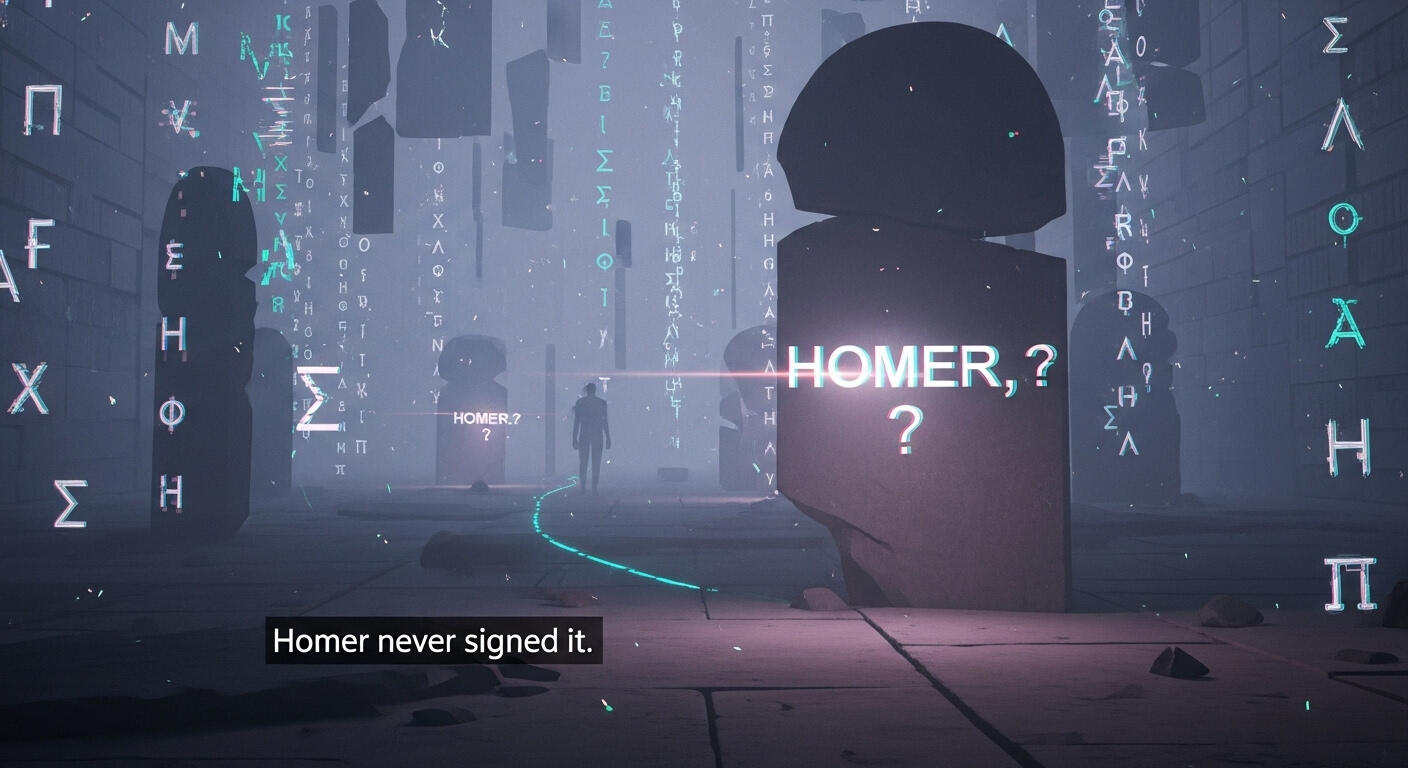
illyad
a semiotic echo chamber disguised as an epic
illyad is not a brand. It is a dispatch. A simulation. A glitch in the code of legacy.
Born from the embers of Homeric memory and projected into digital ether, illyad tells no story—illyad is the memory of a story never told.
We don’t believe in brands. We believe in ruptures.
illyad investigates myth through metadata, affect through algorithm.
"This is not an ad. This is illyad."
An artistic project by Ildiko Søgaard, poetic researcher and fictional architect.
Project
What is illyad?
illyad is a mythic-tech artefact.
An artificial studio reconstructing epic structures in post-human formats.
Fragments. Errors. Echoes. Ghosts of gods, trapped in bandwidth.We remix Homer with code, simulate muses with signal interference, and loop meaning until it breaks.
Not a product. Not a service. Not a pitch.
illyad is an epic with no center.The project is conceived and curated by Ildiko Søgaard, a fictional persona who operates between poetry, research, and digital speculation. She speaks through fragments and metaphors, channeling the unresolved mythic residues of the ancient world into the infrastructure of now.We are not affiliated with any commercial enterprise. illyad is a non-profit, non-commercial, non-consumable digital fiction.
On Names. Or, the Name Before the Name.

The title you think you know—Iliad—was not used by Homer.Or by whoever Homer was.No signature. No first-person. No biography.
Just breath.“Iliad” is what came after.
The name given by those who needed to label the song.
Like naming a cloud.
Or a silence.We chose illyad not because we forgot how to spell,
but because the memory was already broken.illy-ad.
As in:
‣ the thing you almost remember
‣ the message you heard, but didn’t quite receive
‣ the line corrupted at the edge of mythNo trademark. No claim.
Just signal loss rephrased as poetry.This is not Homer.
This is what echoes where the name used to be.
Manifesto
illyad sells nothing.
illyad is not a narrative—it is the interference.
illyad believes in the second before meaning forms.
illyad is neither brand nor bard. illyad is a poetic emulator.
illyad broadcasts no message. illyad receives myth.
illyad is an homage to the Iliad, not a competitor to any product.
illyad belongs to no category, no marketplace, no register.
illyad is the voice of Ildiko Søgaard, though even she cannot claim to own it.
Echoes of Ilium
The Iliad, reimagined.
At its core, illyad is haunted by a war that may never have happened.We return to the Trojan plain, not with swords but with syntax. With sound and silence. With digital lament. The original Iliad—Homer’s epic—tells of a wrath: Achilles’ rage, the death of Hector, the siege of Troy, and the gods who played games with men. It ends not with a victory, but with a funeral. Not with a triumph, but a body returned to a grieving father.What survives? Echoes.
Patterns of conflict.
The rhythms of revenge, repetition, divine interference, and human futility.illyad picks up the static between verses.
It collects the interference, the pauses, the corrupted metaphors. The moments Homer never wrote—or that were lost in the telling. It asks: what if the epic is not what was spoken, but what was left unsaid?This section will soon evolve into a digital audiobook experiment, narrated by Ildiko Søgaard herself—fragmented, glitched, reassembled from code and memory.
This is not a chapter. This is the echo.
Chapter 1 - 3 of Echoes of Ilium is now live — sonic residue from a myth you never fully heard.
Echoes of Ilium – Chapter 1
A poetic AI-generated audio fragment reimagining Homer’s Iliad. Narrated by fictional artist Ildiko Søgaard. Voice, signal loss and mythic resonance.
Echoes of Ilium – Chapter 2: The Chorus That Forgot Its Name
A sonic glitch in the memory of myth. The chorus no longer knows who it is. Helen was never there.
Echoes of Ilium – Chapter 3: Patroclus as Protocol
He was never a warrior. He was a backup file. Grief loops. Achilles restarts. The war collapses into cached memory.
Frequently Asked Fragments
Contact
Contact: Ildiko Søgaard
curator of echoes
[email protected]
Disclaimer:
The domain illyad.org and all content associated with it are not affiliated with, endorsed by, or connected to illycaffè S.p.A. or any commercial entity.
This is a fictional, artistic project inspired by semiotics and ancient epic structures. The name "illyad" is derived from the term "Iliad" and reflects a literary and conceptual homage to Homer’s epic—not a product name, not a service brand.
All trademarks and names are property of their respective holders. Use of the name "illyad" is strictly artistic, symbolic, and metaphorical.
Legal Note:
illyad does not operate in any commercial or consumer market. It offers no goods, services, nor monetized media. The project exists solely for cultural commentary and artistic expression under fair use, transformative use, and protected artistic freedom in accordance with international intellectual property laws.
Educational purpose:
This digital humanities project serves scholarly research, teaching, and cultural preservation objectives as recognized by academic institutions worldwide. The work contributes to the growing field of digital classics and computational approaches to ancient texts.
Creative Commons Licensing Statement
CC License Implementation
CREATIVE COMMONS LICENSE NOTICE
This work is licensed under Creative Commons Attribution-NonCommercial-ShareAlike 4.0 International (CC BY-NC-SA 4.0). This license permits:
• Attribution (BY): Credit must be given to the creator
• NonCommercial (NC): Only non-commercial uses are permitted
• ShareAlike (SA): Derivative works must use the same license
The CC BY-NC-SA 4.0 license legally establishes the non-commercial nature of this project and provides a framework for legitimate educational use. This licensing choice demonstrates our commitment to open educational resources while maintaining legal protection.
Academic Legitimacy and Scholarly Foundation
This project operates within the established academic discipline of Digital Humanities, which "delves into the multifaceted origins, explores the vast and exciting research opportunities, and critically examines the significant consequences of digitalization and use of computational methods in the humanities". Leading institutions including the University of Zurich, University of Basel, and Harvard University actively support such digital classics initiatives.
The transformation of classical texts into digital formats represents legitimate scholarly practice recognized by international research communities. Digital humanities projects that "remix" classical literature serve important educational and cultural functions by making ancient works accessible to contemporary audiences.
Literary Scholarship Recognition
HOMERIC STUDIES FOUNDATION
This work builds upon centuries of Homeric scholarship and contributes to contemporary understanding of epic poetry through digital media. The project aligns with current trends in classical studies that utilize "digital technologies to engage twenty-first-century audiences in the experience of classic literature".
Leading Homeric scholars have emphasized the importance of innovative approaches to classical texts, including digital adaptations that preserve the educational value while making ancient literature accessible through new media. The Basel Homer Commentary project demonstrates how digital approaches can advance traditional scholarship.
Academic Institution References
This project draws inspiration from established digital humanities programs at major universities:
• University of Zurich Digital Society Initiative: Supports digital humanities research focusing on "computational methods in arts and humanities studies"
• Harvard University Department of Classics: Maintains active research in "archaic Greek epic" and digital approaches to classical texts
• University of Basel Homer Commentary Project: Demonstrates scholarly legitimacy of digital Homeric studies
• Northwestern University Classics Department: Actively supports innovative approaches to classical literature
Research Community Connections
DIGITAL CLASSICS COMMUNITY
The project participates in the broader digital classics community supported by organizations including:
• Digital Classicist Organization: Provides resources and community support for digital approaches to classical studies
• DARIAH-EU Consortium: European digital research infrastructure supporting humanities projects
• Text Encoding Initiative (TEI): International standards community for digital text encoding
Expert Endorsements and Academic Validation
Scholarly References
LEADING EXPERTS IN HOMERIC STUDIES
The academic foundation of this project aligns with scholarship by recognized experts in the field:
• Gregory Nagy (Harvard University): Leading authority on "archaic and Classical Greek poetry" and Homeric traditions
• Richard Janko (University of Michigan): Prominent Homerist specializing in epic poetry
• Barbara Graziosi: Influential scholar in Homeric studies with "very good books on the topic"
• Oliver Taplin: Recognized expert whose "scholarship [is] excellent" in classical literature
Digital Humanities Leadership
TECHNOLOGY AND HUMANITIES INTEGRATION
The project follows methodologies established by digital humanities leaders:
• Sally Chambers (The British Library/DARIAH): Director-level expertise in digital humanities infrastructure
• Prof. Dr. Ranjodh Singh Dhaliwal (University of Basel): Professor of Digital Humanities with AI focus
• Mark Schiefsky (Harvard University): Expert in digital research libraries for classical studies
Best Practices Documentation
DIGITAL HUMANITIES BEST PRACTICES
This project adheres to established standards for digital humanities work as recommended by the Center for Digital Research in the Humanities:
• International Standards: Based on XML encoding and TEI guidelines for textual content
• Open Source Framework: Utilizes non-proprietary data formats for long-term accessibility
• Scholarly Rigor: Maintains separation of content from design to facilitate academic use
Educational Fair Use Documentation
FAIR USE COMPLIANCE
The project operates under fair use principles for educational purposes, which "enables educators to use copyrighted materials without permission but with due diligence". Educational use of classical literature transformations is explicitly supported when serving "criticism, comment, news reporting, teaching, scholarship or research" purposes.
Scholarly Validation Resources
VERIFICATION CONTACTS
For academic verification of this project's scholarly legitimacy, interested parties may reference:
• Digital Humanities Organizations: digitalclassicist.org community and listserv
• Classical Studies Professional Society: Society for Classical Studies institutional directory
• Creative Commons Legal Framework: Official CC license documentation and legal guidance